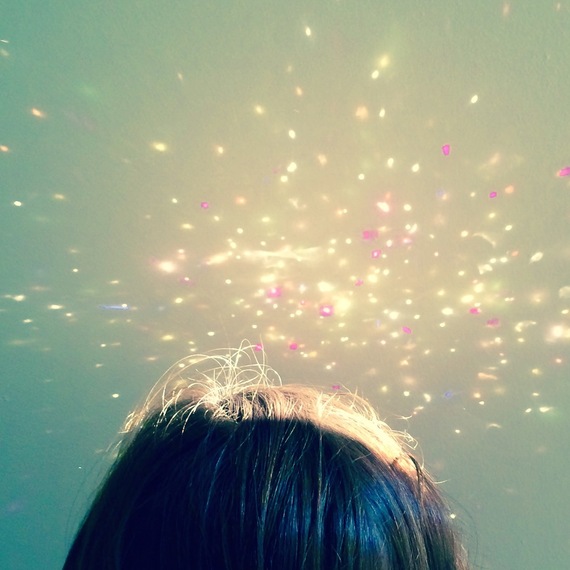From empathy to ethical fashion and beyond.
The other morning, I passed by a small juice cart on Church Street in Lower Manhattan. Brightly painted with pictures of its offerings, it said on the side in large letters: "My Story." My first thought was, "Man. Everybody's got a story." My second thought was, "Well, why shouldn't they?"
I blame/credit the millennial generation* for this penchant for sharing - and sometimes for over-sharing - one's story. This movement came into its own with Facebook and keeps evolving and adapting with newer platforms like Instagram and Snapchat. Everything we do can be offered for public consumption. Today it's apparently appropriate to post something on a public internet forum along the lines of, "I just got back from a long jog, took a shower, and now I'm sitting on the couch drinking a glass of wine and watching Seinfeld reruns."
As a mother of two friendly, curious and independent little girls, I think a lot about this new, open world in which they are spending their formative years. I hope that I can raise them to be smart, strong and above all, kind, in all of their relationships, whether cyber or face-to-face.
I think they will be. Let me tell you why.
I've recently come to appreciate a side of the social media world that I never had before: its ability to generate empathy. And this is one of my greatest hopes for my daughters - that they develop a deep capacity to empathize with others.
Empathy? I'll admit, when we see rising partisanship among our politicians and pundits and incendiary comments to internet articles that erupt into name-calling, it's hard to imagine that empathy is on the rise in our society. Some have even asserted that Gen Y, the "Me Generation," is narcissistic, incapable of empathy. I side with those who oppose this view. In a 2010 post quoting from his article in Psychology Today, "How The Age of Empathy Will Impact Leaders," Ray Williams discusses his "observation, based on the work of Jeremy Rifkin's book The Empathetic Civilization: The Race to Global Consciousness in a World of Crisis:
... researchers in a diverse range of disciplines are arguing that all human activity is embodied experience -- what Rifkin calls participation in the lives of others -- and that the ability to read and respond to another person as if it was you, is the key to how people engage with the world, create identity, develop language, make decisions and define reality.
The rise of the storytelling culture makes me optimistic that we are moving in the right direction.
Writers have known for centuries that audiences are hard-wired to identify with a story's protagonist no matter how different his personality, tastes or views are from their own. Whether it be Victor Frankenstein and his monster or Don Draper, when we absorb ourselves in their stories, we relate to them. Today's bloggers, these new storytellers, are the protagonists in their own installment novels.
With virtually no barriers to posting on the internet, anyone can virtually tell their story. (Yes, this means that we and our children can be exposed to a lot of negative stuff. I intend to do my best to provide adequate supervision and controls while they are under my roof, and my hypothesis relies on others doing the same.) And I optimistically believe that, the more differing points of view to which we are exposed, for better or for worse, the more open and informed we will be to the world around us.
Got that? I'd like to take it even a step further: I believe that empathy born through participation in this new world of storytelling brings with it a correlating drive to live responsibly and to promote justice through our own decisions.
Consider, as an example, the rise of the ethical fashion movement. Today's consumers demand the stories behind every product we buy and every company we support. This wonderful trend has grown hand-in-hand with the social media boom. For how can companies connect with the millennial component (and beyond) of their customer base but through the same open sharing and storytelling in which these customers regularly engage?
How wonderfully promising is this?
The more we know about the stories, meaning the people, behind what we purchase, the more invested we are in who made these products, how they made them and how those people were treated in the process. Even better, the more intimately we consider the products we purchase, the more social responsibility we should demand of the companies behind them. A 2014 study reports that 48 percent of millennials "say they try to select brands that actively support social causes."
In the interest of full disclosure (in keeping with our theme), I'll end this with my own experience, which led me to adopt such an optimistic attitude. In the context of my role at Victoria Road, an ethical fashion brand that promotes up-and-coming designers in emerging markets, I have been introduced to a number of millennial bloggers. I have been impressed. I've found these young entrepreneurs to be smart, interesting, informed and compassionate. They have come of age in a world filled with stories, and they have a nuanced understanding of the importance of storytelling that, in my opinion, is particular to this generation. They want to use the power of storytelling for good - whether it's to share something beautiful they've discovered or to inform their readers about a social cause. And, most importantly in my mind, they are nice.
And these, friends, are all traits I'd like my headstrong daughters to develop as they grow in their roles as independent women and members of our global society.
* Following one standard of birth year between 1981 and 1997, I missed the "millennial" generation by two years, though I remind my Gen-Y husband regularly that we were raised across a generational chasm.
Follow Victoria Road on Instagram | Facebook | Twitter | Pinterest

